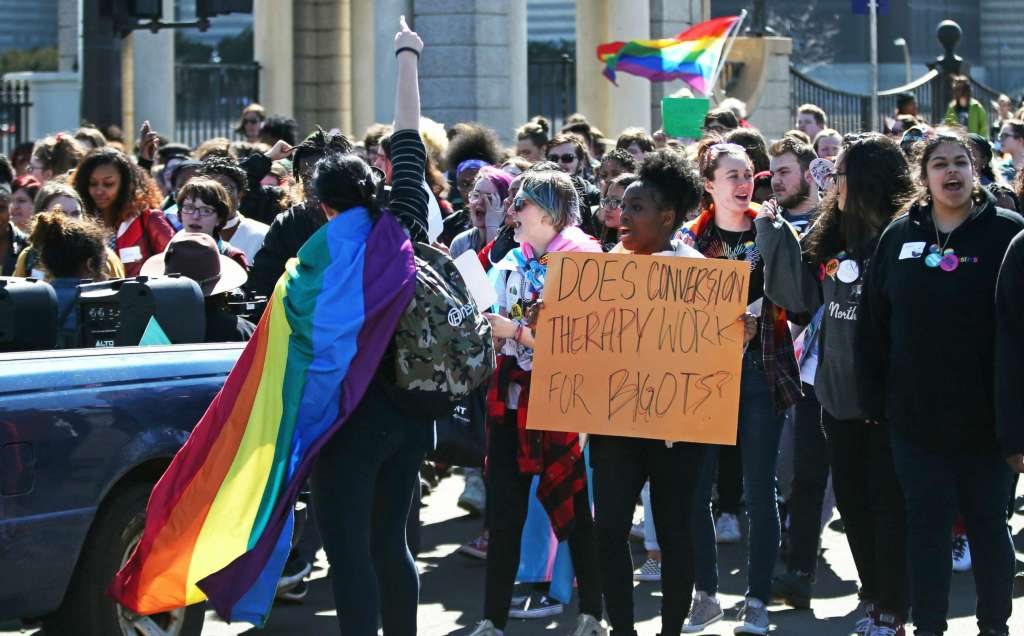Introduction: The Impact of Conversion Therapy on LGBTQ+ Mental Health
Conversion therapy refers to the pseudoscientific practices aimed at changing an individual’s sexual orientation or gender identity. LGBTQ+ individuals who undergo conversion therapy often experience severe psychological trauma and long-lasting negative effects on their mental health. This article examines the harmful effects of conversion therapy on the mental well-being of LGBTQ+ individuals and advocates for its ban.
Conversion therapy, also known as reparative therapy or sexual orientation change efforts (SOCE), encompasses a range of practices that attempt to change an individual’s sexual orientation or gender identity. These practices may include counseling, psychotherapy, religious interventions, aversion therapy, and other harmful methods. The primary objective of conversion therapy is to change LGBTQ+ individuals’ sexual orientation or gender identity to align with heteronormative and cisgender norms.
It is important to note that conversion therapy lacks scientific evidence supporting its efficacy in changing sexual orientation or gender identity. Major medical and mental health organizations, including the American Psychological Association and World Psychiatric Association, oppose conversion therapy and consider it harmful and ineffective. These organizations have released statements and position papers highlighting the lack of scientific basis for conversion therapy and the potential harm it can cause.
Definition and Explanation of Conversion Therapy
Conversion therapy encompasses a range of practices that attempt to change an individual’s sexual orientation or gender identity. The primary objective of conversion therapy is to change LGBTQ+ individuals’ sexual orientation or gender identity to align with heteronormative and cisgender norms. These practices may include counseling, psychotherapy, religious interventions, aversion therapy, and other harmful methods.
For example, aversion therapy involves associating negative stimuli with same-sex attractions or gender nonconforming behaviors to deter LGBTQ+ individuals from expressing their true selves. This may include using electric shocks or nauseating drugs while exposing individuals to same-sex erotic images or situations. Religious counseling approaches may use religious teachings to shame and suppress LGBTQ+ individuals’ sexual orientation or gender identity. This can involve prayer, scripture readings, or spiritual interventions with the aim of changing or suppressing same-sex attractions or gender nonconforming behaviors.
Conversion therapy often involves emotional and psychological abuse, including gaslighting, isolation, and degradation. LGBTQ+ individuals may be made to feel guilty or sinful for their sexual orientation or gender identity, leading to internalized homophobia or transphobia. The harmful practices used in conversion therapy can have detrimental effects on the mental health and well-being of LGBTQ+ individuals.
Negative Mental Health Outcomes Associated with Conversion Therapy
LGBTQ+ individuals who have undergone conversion therapy are at a higher risk of developing mental health disorders such as depression, anxiety, and post-traumatic stress disorder (PTSD). The experience of conversion therapy is associated with higher rates of suicidal ideation, suicide attempts, and self-harm among LGBTQ+ individuals. Additionally, LGBTQ+ individuals who have experienced conversion therapy are more likely to engage in substance abuse as a coping mechanism.
The psychological trauma inflicted by conversion therapy includes feelings of shame, guilt, and rejection. It undermines LGBTQ+ individuals’ self-acceptance and hinders the development of a positive and authentic identity. Conversion therapy exacerbates the existing mental health disparities faced by LGBTQ+ individuals, particularly those who belong to marginalized communities.
Studies have shown that LGBTQ+ individuals who have undergone conversion therapy often experience severe psychological distress, including symptoms of depression, anxiety, and post-traumatic stress disorder (PTSD). They may feel isolated and disconnected from their authentic selves, leading to a deep sense of shame and self-rejection. This can have long-lasting effects on their mental well-being and overall quality of life.
Moreover, the intersectionality of LGBTQ+ identity and mental health is crucial to consider. Conversion therapy not only targets an individual’s sexual orientation or gender identity but also perpetuates discrimination and stigmatization against LGBTQ+ individuals as a whole. This can further contribute to the mental health disparities faced by LGBTQ+ individuals, especially those who already face multiple forms of marginalization based on their race, ethnicity, socioeconomic status, or disability.
The Impact of Conversion Therapy on LGBTQ+ Mental Health
Conversion therapy subjects LGBTQ+ individuals to psychological trauma, including feelings of shame, guilt, and rejection. It undermines LGBTQ+ individuals’ self-acceptance and hinders the development of a positive and authentic identity. Conversion therapy exacerbates the existing mental health disparities faced by LGBTQ+ individuals, particularly those who belong to marginalized communities.
For example, LGBTQ+ individuals who have undergone conversion therapy often experience severe psychological distress, including symptoms of depression, anxiety, and post-traumatic stress disorder (PTSD). They may feel isolated and disconnected from their authentic selves, leading to a deep sense of shame and self-rejection. This can have long-lasting effects on their mental well-being and overall quality of life.
Research has shown that LGBTQ+ individuals who have experienced conversion therapy are at a higher risk of developing mental health disorders such as depression, anxiety, and post-traumatic stress disorder (PTSD). They may also experience higher rates of suicidal ideation, suicide attempts, and self-harm compared to LGBTQ+ individuals who have not undergone conversion therapy. The psychological trauma inflicted by conversion therapy can have long-lasting effects, impacting an individual’s self-esteem, self-worth, and overall mental well-being.
Furthermore, the negative impact of conversion therapy extends beyond the individual level. By perpetuating discrimination and stigmatization against LGBTQ+ individuals, conversion therapy contributes to the overall mental health disparities faced by the LGBTQ+ community. It reinforces societal messages that being LGBTQ+ is inherently wrong or flawed, leading to increased rates of mental health issues among LGBTQ+ individuals.
In conclusion, conversion therapy has severe and long-lasting negative effects on the mental health of LGBTQ+ individuals. It is crucial to ban conversion therapy, provide inclusive mental health support, and promote resilience and acceptance to protect the well-being of LGBTQ+ individuals.
Harmful Practices Used in Conversion Therapy
Conversion therapy employs various harmful practices that can have detrimental effects on the mental health of LGBTQ+ individuals. Aversion therapy, for example, involves associating negative stimuli with same-sex attractions or gender nonconforming behaviors. This aims to deter LGBTQ+ individuals from expressing their true selves. The use of aversive techniques, such as electric shocks or nauseating drugs, can be physically and emotionally traumatic.
Religious counseling approaches may use religious teachings to shame and suppress LGBTQ+ individuals’ sexual orientation or gender identity. This can involve prayer, scripture readings, or spiritual interventions with the aim of changing or suppressing same-sex attractions or gender nonconforming behaviors. These approaches can lead to internalized homophobia or transphobia, causing significant harm to LGBTQ+ individuals’ mental well-being.
Another common harmful practice in conversion therapy is emotional and psychological abuse. LGBTQ+ individuals may be subjected to gaslighting, where they are made to doubt their own experiences and perceptions. This can lead to confusion, self-doubt, and a loss of trust in oneself. Isolation is often used as a means of control, cutting individuals off from support networks and affirming environments. Degradation and humiliation are also frequently employed to undermine LGBTQ+ individuals’ self-worth and identity.
These harmful practices can have significant negative effects on the mental health of LGBTQ+ individuals. They can lead to increased levels of psychological distress, self-esteem issues, and feelings of worthlessness. LGBTQ+ individuals may internalize the negative messaging and experience long-lasting emotional trauma as a result.
It is crucial to note that the harmful practices used in conversion therapy are not supported by scientific evidence. Major medical and mental health organizations, including the American Psychological Association and World Psychiatric Association, oppose conversion therapy and consider it ineffective and harmful. These organizations have released statements and position papers highlighting the lack of scientific basis for conversion therapy and the potential harm it can cause.
Lack of Scientific Basis and Professional Consensus
Conversion therapy lacks scientific evidence supporting its efficacy in changing sexual orientation or gender identity. Major medical and mental health organizations, including the American Psychological Association (APA) and World Psychiatric Association, oppose conversion therapy and consider it harmful and ineffective. These organizations have released statements and position papers highlighting the lack of scientific basis for conversion therapy and the potential harm it can cause.
The APA, in its resolution on Appropriate Affirmative Responses to Sexual Orientation Distress and Change Efforts, states that “conversion therapy perpetuates outdated views of gender roles and identities as well as the negative stereotypes associated with LGBTQ+ individuals.” The organization emphasizes the importance of affirmative therapeutic practices that support LGBTQ+ individuals’ well-being and self-acceptance. Similarly, the World Psychiatric Association issued a statement opposing conversion therapy, highlighting the lack of scientific validity and the potential harm it can cause.
Moreover, conversion therapy violates professional ethical standards by promoting discrimination and stigmatization against LGBTQ+ individuals. Mental health professionals have a duty to provide affirming and inclusive care for all individuals, regardless of their sexual orientation or gender identity. Engaging in conversion therapy goes against these ethical principles and can cause significant harm to LGBTQ+ individuals’ mental health.
The condemnation of conversion therapy by major medical and mental health organizations reflects a professional consensus on the lack of scientific basis and potential harm associated with these practices. It is essential for mental health professionals to stay informed about the current research and best practices to provide inclusive and affirming care to LGBTQ+ individuals.
Legal Status and Efforts to Ban Conversion Therapy
Conversion therapy is banned in several countries and regions, including parts of the United States, Canada, Europe, and Australia. These legislative bans aim to protect LGBTQ+ individuals from the harmful practices of conversion therapy and promote their mental well-being. There is an increasing global movement to enact legislation banning conversion therapy and advocating for LGBTQ+ rights.
In the United States, for example, several states have implemented laws and regulations to ban conversion therapy for minors. These bans recognize that minors are particularly vulnerable to the potential harms associated with conversion therapy and aim to protect them from these practices. The efforts to ban conversion therapy are driven by various stakeholders, including LGBTQ+ rights organizations, mental health professionals, and survivors of conversion therapy.
Efforts to ban conversion therapy are not limited to legislative actions. They also include raising awareness about the harmful effects of conversion therapy and advocating for LGBTQ+ mental health support. LGBTQ+ rights organizations, mental health professionals, and survivors of conversion therapy work together to educate policymakers, communities, and the general public about the importance of LGBTQ+ mental health and the need to prioritize the well-being of LGBTQ+ individuals.
It is important to note that while progress has been made in banning conversion therapy, there is still work to be done. Some jurisdictions have yet to implement comprehensive bans, and there is a need for continued advocacy and awareness to protect LGBTQ+ individuals from the harmful effects of conversion therapy.
Importance of LGBTQ+ Mental Health Support and Resources
LGBTQ+ individuals require access to mental health professionals who are knowledgeable about their unique experiences and provide affirming and inclusive care. Inclusive therapy options are crucial for LGBTQ+ individuals to feel safe and supported in their mental health journey. Mental health professionals should be trained in LGBTQ+ issues and competent in addressing the specific challenges faced by LGBTQ+ individuals who have experienced conversion therapy.
Building strong support systems within LGBTQ+ communities can also help individuals cope with the mental health challenges associated with conversion therapy. Supportive communities provide a sense of belonging, understanding, and validation, which can contribute to the well-being and resilience of LGBTQ+ individuals.
Additionally, numerous organizations, helplines, and online communities provide support, resources, and guidance to LGBTQ+ individuals who have experienced conversion therapy. These resources offer a safe space for LGBTQ+ individuals to share their experiences, access information, and connect with others who have gone through similar challenges. Some of these resources include:
- The Trevor Project: A leading national organization providing crisis intervention and suicide prevention services to LGBTQ+ youth.
- National LGBTQ+ Task Force: An organization dedicated to advancing equality and providing resources for LGBTQ+ individuals.
- GLAAD: An LGBTQ+ media advocacy organization that offers resources and support for LGBTQ+ individuals and their families.
- PFLAG: A national organization offering support, education, and advocacy for LGBTQ+ individuals and their families.
By accessing these resources and seeking support, LGBTQ+ individuals who have experienced conversion therapy can find the help they need to navigate their mental health challenges and foster resilience.
Promoting LGBTQ+ Mental Health and Resilience
Encouraging resilience-building strategies is essential to support the mental health of LGBTQ+ individuals who have experienced conversion therapy. Strategies such as self-compassion, self-care, and finding affirming spaces can help individuals navigate the mental health challenges resulting from conversion therapy. Practicing self-compassion involves being kind to oneself and acknowledging the challenges faced due to conversion therapy. Engaging in self-care activities, such as exercise, mindfulness, or engaging in hobbies, can help promote overall well-being and provide a sense of empowerment.
Education and training for mental health professionals on LGBTQ+ issues and the harmful effects of conversion therapy are crucial. Increasing awareness and understanding of LGBTQ+ mental health can improve the support available to LGBTQ+ individuals. By incorporating inclusive practices and staying up-to-date with the latest research and best practices, mental health professionals can provide affirming and competent care to LGBTQ+ individuals.
Furthermore, allies can play a crucial role in fostering safe and inclusive environments for LGBTQ+ individuals. By challenging stigma and discrimination, advocating for LGBTQ+ rights, and actively supporting and affirming LGBTQ+ individuals, allies can contribute to the mental well-being and resilience of LGBTQ+ individuals.
In conclusion, conversion therapy has severe and long-lasting negative effects on the mental health of LGBTQ+ individuals. It subjects them to psychological trauma, undermines their self-acceptance and identity, and exacerbates existing mental health disparities. Banning conversion therapy, providing inclusive mental health support, and promoting resilience and acceptance are crucial steps towards protecting the well-being of LGBTQ+ individuals. Efforts are being made globally to ban conversion therapy and promote LGBTQ+ mental health support, but more work is needed to create a safe and affirming environment for all LGBTQ+ individuals.
References:
- American Psychological Association (APA). (2009). Appropriate therapeutic responses to sexual orientation.
- World Psychiatric Association. (2018). WPA statement on conversion therapy.





Leave a comment